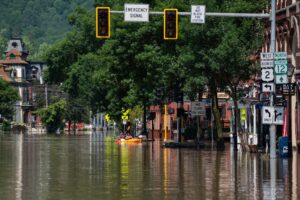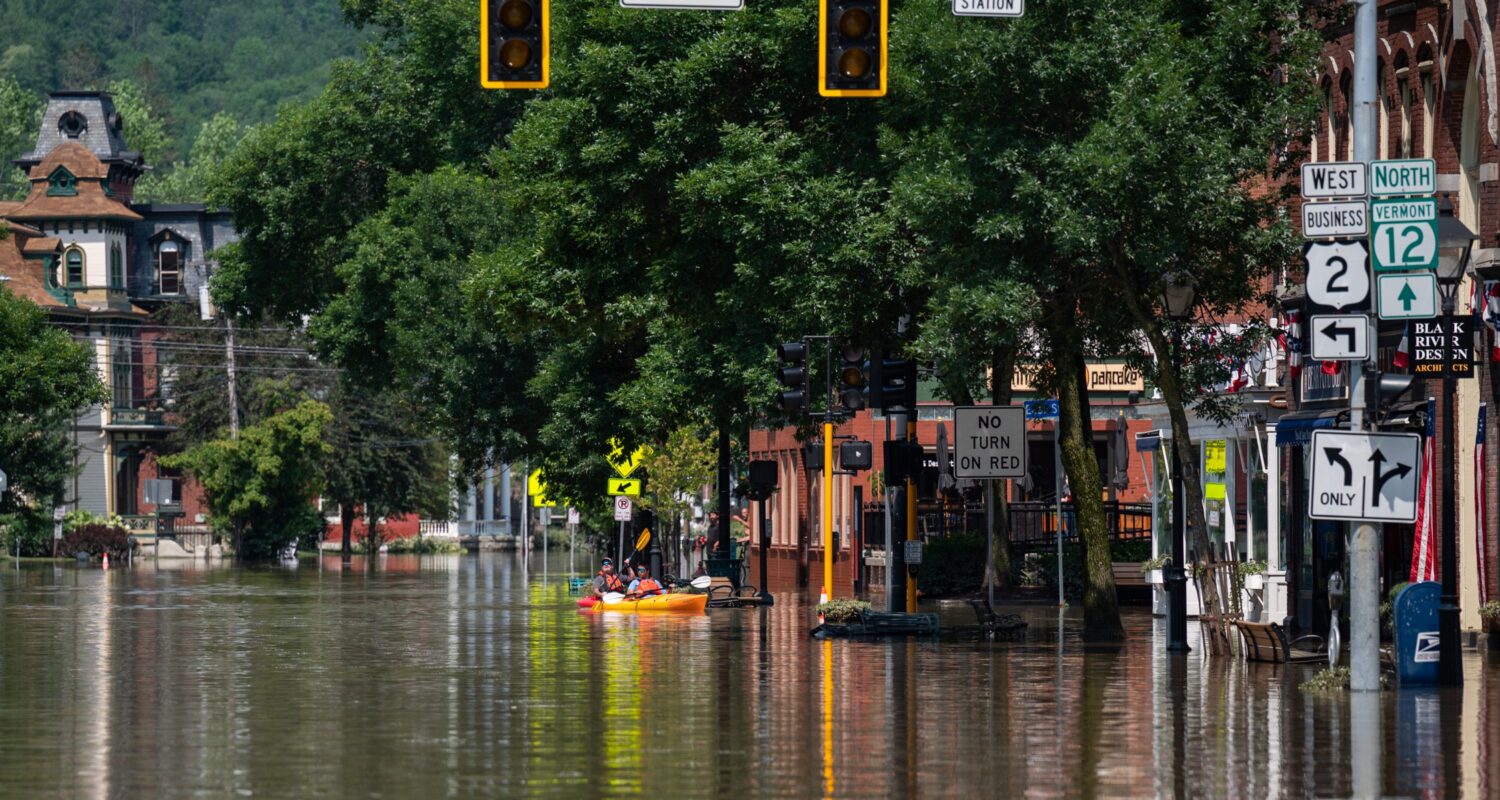From Bill McKibben
You flood it, you pay for it.
States are considering ‘climate superfund’ laws to hold Big Oil accountable
MAR 15, 2024

Vermont’s capitol city, underwater in epic July flooding that wrecked most of Montpelier’s retail district
One prong of the climate fight involves installing so much renewable energy that fossil fuel use actually declines dramatically—a few places are finally showing that’s possible, like sunny Germany which last week said emissions in 2023 dropped more than ten percent.
But if that’s going to happen everywhere, and fast enough, it’s going to require the other prong: holding back the fossil fuel industry. The problem is that the politics of oil-producing countries don’t allow it—that’s why the Inflation Reduction Act was all carrots/no sticks. And it’s not just DC—in Lula’s progressive Brazil the national oil company, already Exxon-sized, said last week it plans on outproducing all its peers except Saudi Arabia and Iran by 2035.
So you need a mechanism for places where there is no oil in the ground to inflict some hurt on Big Oil—and get some justice at the same time. Like, Vermont. And New York, and Maryland, and Massachusetts.
In a just world, Big Oil would be criminally prosecuted, since investigative reporting has made it abundantly clear that it knew what it was doing (Aaron Regunberg and David Arkush last week laid out an excellent argument as to why these companies could be charged with homicide). In civil court, jurisdictions can simply sue the fossil fuel industry, and that’s actually been happening more and more often (on Wednesday a Belgian farmer sued French energy giant Total for making his life harder). Suits like that—many premised on the fact that Big Oil clearly knew about the dangers they were causing—are wending their way through the American courts, but our justice system is a) slow and b) bent in the direction of the powerful.
So legislators are opening up another front—”climate superfund” laws that treat disasters like Vermont’s summer flooding as if they were a toxic dump whose cleanup can be charged to the corporation that caused them. That would have been hard even a few years ago, but “climate attribution” science is now robust: it’s increasingly easy to prove that absent global warming we wouldn’t have the endless downpours/droughts/fires. If a chemical company pollutes a site, the superfund law has been a way to make it pay for the remediation—so if Vermont’s flooding cost its taxpayers $2.5 billion to repair, why should they be on the hook?
I’m talking about Vermont because it might be the first state to adopt such a law, as it was the first to abolish slavery or allow civil unions—the legislature and the governor will decide in the next few weeks. And I’m talking about it because I live here, in a town that is struggling to pay for the repairs to its roads after last summer’s record flooding. We heard the sobering litany at town meeting earlier this month; every culvert makes it that much harder to keep our school open. New York is also close to passing such a law, and perhaps Maryland and Massachusetts, as Katie Meyers pointed out in Grist recently—all of them states without significant hydrocarbon production, and all of them states with a lot of climate damage.
Campaigners led by the Vermont Public Research Interest Group launched the campaign last summer, accompanied by a twenty-foot-long inflatable pig. VPIRG’s executive director Paul Burns, and Lauren Hierl, a member of the selectboard in flood-devastated Montpelier, explained the logic in an oped:
The biggest oil companies in the world made more than $200 billion in profits last year, while Vermonters were forced to pay record prices at the pump — and got stuck with the costs of climate change cleanup in our communities. That shouldn’t be the case. Big Oil knowingly made a mess of the climate. They should help pay to clean it up.
It’s a lesson we all learned in kindergarten: If you make a mess, you clean it up.
The argument has obviously appealed to legislators. Here’s the state’s news website, VTDigger, describing one of the more conservative Democrats
Sen. Dick Sears, D-Bennington, who chairs the Senate Judiciary Committee, said he would have “absolutely opposed” such a bill 20 years ago. Chemical contamination in the Bennington area, which has permanently altered the lives of some of his constituents, changed his mind.
“Who’s going to pay for the damage done?” Sears said. “Is it going to be the taxpayer? Is it going to be the homeowner or the small business? Or is it going to be the company that contributed to the problem? I say it should be the company that contributed to the problem.”
It will be fascinating to see what the state’s governor, Phil Scott, does with the bill. He is a Republican, but a remnant one, harkening back to the state’s Yankee past. (For a hundred years until the 1960s Vermont was the most reliably GOP state in America). He brought the state through covid with fewer deaths per capita, and less division, than any other; and since he’s a contractor by profession he understands viscerally how much it costs to repair a road or rebuild a bridge. If he signed this bill, he’d be reflecting the clear consensus of the state’s voters. And the great marker of those Yankee Republicans was frugality—cheapness, but the good kind. It’s hard to imagine that he wants Vermont taxpayers on the hook here.
The oil industry (in between insisting that all of this is a plot by the Rockefellers) has hinted that paying these damages could raise prices for consumers, but that’s silly—the price of oil is set on a world market. And they’ve of course promised to go to court if they are charged for their damage. Vermont’s got good lawyers—it’s got one of the best environmental law schools in the nation. And New York State has lawyers upon lawyers, as Donald Trump is finding out. Massachusetts governor Maura Healy used to be AG, and she’s taken on big oil in the past. It’s a fight, but a winnable one.
Yes, it would be best to do this at the federal level (and Vermont’s Senators Bernie Sanders and Peter Welch have introduced legislation to do just that). But the Senate filibuster means that oil states will have enough clout to block those laws, at least while they could still do some good. So for a while it’s going to be a coalition of the oil-less (you can ask your state to get involved here)
It’s been a great blessing to Vermont that there’s nothing much of value beneath the soil (well, granite, but a few quarries are enough to produce an eternity of tombstones). And now that geological fact may prove to be of great value to the planet.



